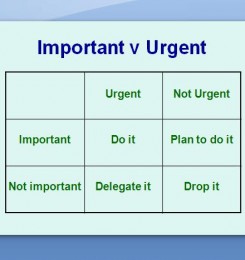 Hopefully you have a grasp of appointment time. Now let’s look at discretionary time.
Hopefully you have a grasp of appointment time. Now let’s look at discretionary time.
As the term implies this is time over which you have discretion. Appointments are often determined by someone else; discretionary time is always for you to determine and use at your discretion. In any day this is the time where the battle of fulfilment and achievement tends to be won or lost (although, believe it or not, even meetings can be fulfilling and satisfying, though many see them as wasting hours to keep minutes!).
Are you a list keeper? As one who lives by lists I am often amazed to find that about 50% of people do not use them to plan their time. Recently I was in Africa and my friend told me that typically his friends would wake each morning and then decide what to do that day – whatever occurred to them. If you are one of those I urge you to begin making a daily list. Without it, prioritising your discretionary time will be difficult and you will not find that you have used your time to maximum effect.
The ‘Do it’ list
This is the list where you collect up all the things that you hope to do sometime or, more specifically, may hope to do today. But if you write down this list you will probably find that, realistically, there is no hope of completing everything.
Before we continue, I would like you to take a piece of paper, if you do not already have such a list, and write down all the things you would like to do today. This will help you as we continue to discuss how to prioritise. Really – please do stop and do it!
Now look at that list, which may have 10-15 items on it. If you start to work your way down the list from the top will you be achieving everything in priority order? Be honest with your answer – I am sure it is ‘no’. The reason is that the order of the list is an accident of history – the ones at the top came to mind first and the ones at the end last! That does not assign any priority to the list – it is random.
So what do you do? Assuming the list is 15 items long you can try listing them 1-15 according to some priority scale you may have in your mind. Not easy is it? Why is that? Because you have to compare each item with every other item – to do that you have to make over 100 comparative decisions! This is very unwieldy.
Important or Urgent?
The solution is as easy as ABC. But before we see why there is a very important issue to consider; how to prioritise between the Important and the Urgent.
Important activities are a function of your value system – something that is best done by you because of your gifting or job decription and something that you feel is significant in importance on a basis which only you can define. We will look at this a little more next time.
Urgent is purely a function of time – if you don’t do it today tomorrow is too late. But that does not make it important. It is just one factor you have to take into account when you are prioritising. It is possible that it is unimportant and will have to be left undone because something else must take your time. Or perhaps you should ask someone else to do it for you.
 Consider this diagram for which I am indebted to my friend Bryn Hughes, Christian Trainer and Consultant in Personal and Organisational Development. Here you will see that there are four possible responses to any particular scenario.
Consider this diagram for which I am indebted to my friend Bryn Hughes, Christian Trainer and Consultant in Personal and Organisational Development. Here you will see that there are four possible responses to any particular scenario.
- If something is both Important and Urgent it needs to come high on you priority list.
- If it is Important but not Urgent you should Plan to do it.
- If it is unimportant but urgent Delegate it.
- If it is neither important nor urgent Drop it!
In the next posting I will help you refine this and give you a simple way of prioritising the whole list. Meanwhile, if you are not already a list maker, please start making a daily ‘Do it’ list. Even doing that will help you to focus your thinking and planning for the day.
